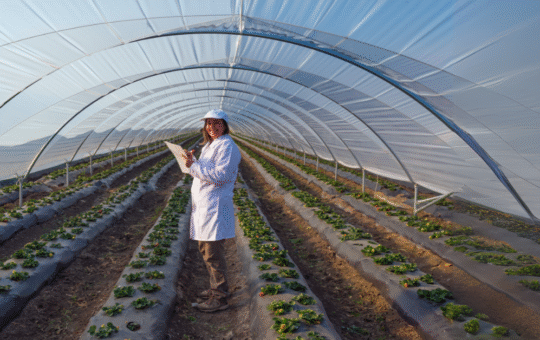
Level 1 Award in Introduction to Agricultural Engineering
- Solid Foundation: Develop a basic understanding of agricultural engineering concepts and practices.
- Industry-Relevant Skills: Learn the essential skills required for a career in agricultural engineering or farming technology.
- Practical Knowledge: Gain insight into the operation and maintenance of agricultural machinery, tools, and systems.
- Career Pathways: This award provides a pathway to more advanced qualifications and career opportunities in agricultural engineering.
- Sustainable Agriculture Focus: Understand the importance of sustainable practices in the agricultural sector.
- Understand Agricultural Engineering Fundamentals: Learn the basic concepts of agricultural engineering, including its history, principles, and significance in modern farming.
- Familiarity with Agricultural Machinery: Gain an understanding of the common machinery used in agriculture and its operational functions.
- Application of Basic Farming Tools: Develop knowledge on the basic tools and equipment used in agricultural tasks, including sowing, plowing, and harvesting.
- Introduction to Farm Automation: Learn about the early stages of farm automation and its role in increasing farming efficiency.
- Importance of Sustainable Practices: Understand the relevance of sustainability in agricultural practices and the role of engineering in promoting environmental and economic sustainability.
- Introduction to Agricultural Engineering
- Overview of agricultural engineering as a field.
- The evolution of agricultural engineering and its impact on farming practices.
- The role of technology in modern agriculture.
- Agricultural Machinery and Equipment
- Basic types of machinery used in farming: tractors, harvesters, plows, and sowers.
- Introduction to machinery functions, maintenance, and safety protocols.
- Overview of new technologies in farming machinery.
- Basic Farm Tools and Techniques
- Introduction to essential tools used in farming tasks.
- Maintenance and proper usage of hand tools, power tools, and farm equipment.
- The importance of efficiency and productivity in farming operations.
- Sustainable Agricultural Practices
- Principles of sustainable farming and its environmental benefits.
- Introduction to practices that promote soil health, water conservation, and biodiversity.
- Basic irrigation, waste management, and crop rotation techniques.
- Farm Automation and Innovation
- The role of automation in increasing agricultural productivity.
- Introduction to sensor-based technologies and robotics in farming.
- The future of agricultural technology and smart farming.
- Agricultural Technician
- Farm Equipment Operator
- Machinery Maintenance Assistant
- Junior Agricultural Engineer
- Farm Automation Support Technician
- Expert Instruction: Learn from experienced professionals in the field of agricultural engineering.
- Hands-On Experience: Practical exposure to agricultural machinery and tools ensures students gain real-world skills.
- Comprehensive Curriculum: Cover essential topics that build a strong foundation in agricultural engineering.
- Sustainability-Focused: Understand the role of sustainable practices in modern agriculture, enhancing environmental and economic outcomes.
- Career-Ready Skills: Equip yourself with the knowledge and skills necessary to start a career in agricultural engineering or related fields.
Study Units
- Introduction to Agricultural Engineering
- Overview of agricultural engineering as a field.
- The evolution of agricultural engineering and its impact on farming practices.
- The role of technology in modern agriculture.
- Agricultural Machinery and Equipment
- Basic types of machinery used in farming: tractors, harvesters, plows, and sowers.
- Introduction to machinery functions, maintenance, and safety protocols.
- Overview of new technologies in farming machinery.
- Basic Farm Tools and Techniques
- Introduction to essential tools used in farming tasks.
- Maintenance and proper usage of hand tools, power tools, and farm equipment.
- The importance of efficiency and productivity in farming operations.
- Sustainable Agricultural Practices
- Principles of sustainable farming and its environmental benefits.
- Introduction to practices that promote soil health, water conservation, and biodiversity.
- Basic irrigation, waste management, and crop rotation techniques.
- Farm Automation and Innovation
- The role of automation in increasing agricultural productivity.
- Introduction to sensor-based technologies and robotics in farming.
- The future of agricultural technology and smart farming.
Upon successful completion of the award, students will be able to:
- Understand Agricultural Engineering Fundamentals: Learn the basic concepts of agricultural engineering, including its history, principles, and significance in modern farming.
- Familiarity with Agricultural Machinery: Gain an understanding of the common machinery used in agriculture and its operational functions.
- Application of Basic Farming Tools: Develop knowledge on the basic tools and equipment used in agricultural tasks, including sowing, plowing, and harvesting.
- Introduction to Farm Automation: Learn about the early stages of farm automation and its role in increasing farming efficiency.
- Importance of Sustainable Practices: Understand the relevance of sustainability in agricultural practices and the role of engineering in promoting environmental and economic sustainability.
The Level 1 Award in Introduction to Agricultural Engineering is designed for individuals who are looking to explore the basics of agricultural engineering and gain foundational knowledge in farming technology. This course is perfect for:
Individuals Interested in Agricultural Engineering
Those who are curious about how engineering and technology are applied in agriculture and are considering a career in this growing field.
Aspiring Agricultural Technicians
People looking to become agricultural technicians or operators of farm machinery and equipment, seeking an introduction to the tools and systems that keep modern farms running.
Farm Workers or Operators
Farm workers who want to expand their skill set and enhance their understanding of the machinery and systems used in farming operations.
Students Interested in Farming Technology
Students or recent graduates interested in learning the principles of agricultural engineering and exploring career pathways in the agricultural sector.
Those Interested in Sustainable Farming Practices
Individuals who want to learn how agricultural engineering contributes to more sustainable, efficient, and eco-friendly farming techniques.
Career Changers
People from other technical fields who are considering transitioning to agricultural engineering or farming-related roles and need an entry-level qualification to start.
Hobby Farmers or Small-Scale Farmers
Anyone involved in farming on a small scale who is interested in enhancing their understanding of agricultural machinery and sustainable practices.
Our assessment process is designed to ensure every learner achieves the required level of knowledge, skills, and understanding outlined in each course unit.
Purpose of Assessment
Assessment helps measure how well a learner has met the learning outcomes. It ensures consistency, quality, and fairness across all learners.
What Learners Need to Do
Learners must provide clear evidence that shows they have met all the learning outcomes and assessment criteria for each unit. This evidence can take different forms depending on the course and type of learning.
Types of Acceptable Evidence
Assignments, reports, or projects
Worksheets or written tasks
Portfolios of practical work
Answers to oral or written questions
Test or exam papers
Understanding the Structure
Learning outcomes explain what learners should know, understand, or be able to do.
Assessment criteria set the standard learners must meet to achieve each learning outcome.
Assessment Guidelines
All assessment must be authentic, current, and relevant to the unit.
Evidence must match each assessment criterion clearly.
Plagiarism or copied work is not accepted.
All learners must complete assessments within the given timelines.
Where applicable, assessments may be reviewed or verified by internal or external quality assurers.
Full learning outcomes and assessment criteria for each qualification are available from page 8 of the course handbook.
Top Courses
No results found.
Related Courses
Let's Get in touch
Deleting Course Review
Course Access
This course is password protected. To access it please enter your password below:



